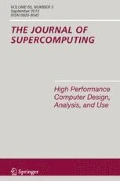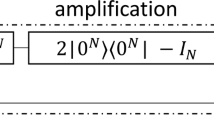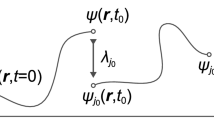Abstract
Generating random numbers is important for many real-world applications, including cryptography, statistical sampling and Monte Carlo simulations. Quantum systems subject to a measurement produce random results via Born’s rule, and thus it is natural to study the possibility of using such systems in order to generate high-quality random numbers. However, current quantum devices are subject to errors and noise, which can make the output bits deviate from the uniform distribution. In this work, we propose and analyse two protocols that can be used to increase the uniformity of the bits obtained when running a circuit with a Hadamard gate and a measurement in a noisy quantum computer. These protocols may be used prior to other standard processes, such as randomness amplification. We conduct experiments on both a quantum simulator and a real quantum computer, obtaining results that suggest that these protocols are useful to improve the probability of the generated bits passing statistical tests for uniformity.


Similar content being viewed by others
References
Aleksandrowicz G, Alexander T, Barkoutsos P, Bello L, Ben-Haim Y, Bucher D, Cabrera-Hernández FJ, Carballo-Franquis J, Chen A, Chen C-F, Chow JM, Córcoles-Gonzales AD, Cross AJ, Cross A, Cruz-Benito J, Culver C, De La Puente González S, De La Torre E, Ding D, Dumitrescu E, Duran I, Eendebak P, Everitt M, Sertage IF, Frisch A, Fuhrer A, Gambetta J, Gago BG, Gomez-Mosquera J, Greenberg D, Hamamura I, Havlicek V, Hellmers J, Herok Ł, Horii H, Hu S, Imamichi T, Itoko T, Javadi-Abhari A, Kanazawa N, Karazeev A, Krsulich K, Liu P, Luh Y, Maeng Y, Marques M, Martín-Fernández FJ, McClure DT, McKay D, Meesala S, Mezzacapo A, Moll N, Rodríguez DM, Nannicini G, Nation P, Ollitrault P, O'Riordan LJ, Paik H, Pérez J, Phan A, Pistoia M, Prutyanov V, Reuter M, Rice J, Davila AR, Rudy RHP, Ryu M, Sathaye N, Schnabel C, Schoute E, Setia K, Shi Y, Silva A, Siraichi Y, Sivarajah S, Smolin JA, Soeken M, Takahashi H, Tavernelli I, Taylor C, Taylour P, Trabing K, Treinish M, Turner W, Vogt-Lee D, Vuillot C, Wildstrom JA, Wilson J, Winston E, Wood C, Wood S, Wörner S, Akhalwaya IY, Zoufal C (2019) Qiskit: An open-source framework for quantum computing. Zenodo, 0.7.2. https://doi.org/10.5281/zenodo.2562111
Acín A, Masanes L (2016) Certified randomness in quantum physics. Nature 540:213–219
Asmussen S, Glynn P (2007) Stochastic simulation: algorithms and analysis. Springer, Berlin
Bakiri M, Guyeux C, Couchot JF, Oudjida AK (2018) Survey on hardware implementation of random number generators on fpga: theory and experimental analyses. Comput Sci Rev 27:135–153
Bassham LE, Rukhin AL, Soto J et al (2010) A statistical test suite for random and pseudorandom number generators for cryptographic applications. Technical Report, National Institute of Standards and Technology, Gaithersburg, MD, USA
Bera MN, Acín A, Kuś M, Mitchell MW, Lewenstein M (2017) Randomness in quantum mechanics: philosophy, physics and technology. Reports Progress Phys 80(12):124,001
Born M (1955) Statistical interpretation of quantum mechanics. Science 122(3172):675–679
Brown RG (2020) Dieharder: a random number test suite. https://webhome.phy.duke.edu/~rgb/General/dieharder.php. Last accessed December 2nd
Combarro E, Carminati F, Vallecorsa S, Ranilla J, Rúa I (2020) Quantum random numbers generated by the cloud superconducting quantum computer. Bristol Quantum Information Technologies Workshop (BQIT:20)
Combarro E, Carminati F, Vallecorsa S, Ranilla J, Rúa I (2020) Two simple protocols for improving the uniformity of quantum random bits in the presence of noise. In 20th Computational and Mathematical Methods in Science and Engineering Conference
Combarro EF, Ranilla J, Rúa I (2019) A quantum algorithm for the commutativity of finite dimensional algebras. IEEE Access 7:45554–45562
Gentle JE (2004) Random number generation and monte carlo methods. Springer, Berlin
Grover LK (1996) A fast quantum mechanical algorithm for database search. In: Proceedings of the Twenty-eighth Annual ACM Symposium on Theory of Computing, STOC ’96, pp. 212–219. ACM, New York, NY, USA
Herrero-Collantes M, Garcia-Escartin JC (2017) Quantum random number generators. Rev Mod Phys 89:015,004
IBM: IBM Q Experience. https://quantum-computing.ibm.com/. Last accessed December 2nd, 2020
James F, Moneta L (2020) Review of high-quality random number generators. Comput Softw Big Sci 4:2
Karp RM (1991) An introduction to randomized algorithms. Discrete Appl Math 34(1):165–201
Kollmitzer C, Schauer S, Rass S, Rainer B (2020) Quantum random number generation theory and practice: theory and practice. Springer, Berlin
L’Ecuyer P (2012) Random number generation. In: Gentle JE, Härdle WK, Mori Y (eds) Handbook of computational statistics: concepts and methods. Springer, Berlin Heidelberg, Berlin, Heidelberg
Li L, Yu F, Tang Q, Song Y, Xu Q, Cai S (2019) A survey on true random number generators based on Chaos. Discrete Dyn Nature Soc 2019:1–10
Liu Y, Zhao Q, Li MH et al (2018) Device-independent quantum random-number generation. Nature 562(7728):548–551
Luby M (1996) Pseudorandomness and cryptographic applications. Princeton University Press, Princeton, NJ
L’Ecuyer P, Simard R (2007) Testu01: A c library for empirical testing of random number generators. ACM Trans Math Softw 33(4):1–40
Ma X, Yuan X, Cao Z, Qi B, Zhang Z (2016) Quantum random number generation. npj Quantum Inf 2(1):16,021
Nielsen MA, Chuang IL (2011) Quantum computation and quantum information, 10th edn. Cambridge University Press, Cambridge
Schlosshauer M, Kofler J, Zeilinger A (2013) A snapshot of foundational attitudes toward quantum mechanics. Stud History Philos Sci Part B: Stud History Philos Modern Phys 44(3):222–230
Shaltiel R (2011) An introduction to randomness extractors. In: Aceto L, Henzinger M, Sgall J (eds) Automata, languages and programming. Springer, Berlin Heidelberg, Berlin, Heidelberg, pp 21–41
Shor P (1994) Algorithms for quantum computation: discrete logarithms and factoring. In Proceedings of FOCS pp. 124–134
Stipčević M, Koç ÇK (2014) True random number generators. In: Koç ÇK (ed) Open problems in mathematics and computational science. Springer, Cham
Tamura K, Shikano Y (2019) Quantum random numbers generated by the cloud superconducting quantum computer. In International Symposium on Mathematics, Quantum Theory, and Cryptography: Proceedings of MQC 2019
Acknowledgements
This work was supported in part by the Ministry of Economy, Industry and Competitiveness from Spain/FEDER under grant MTM-2017-83506-C2-2-P, by Ministry of Science and Innovation from Spain/FEDER under grant RTI2018-098085-B-C44, and by he Regional Ministry of the Principality of Asturias under grants FC-GRUPIN-IDI/2018/000193 and FC-GRUPIN-IDI/2018/000226.
Author information
Authors and Affiliations
Corresponding author
Additional information
Publisher's Note
Springer Nature remains neutral with regard to jurisdictional claims in published maps and institutional affiliations.
Rights and permissions
About this article
Cite this article
Combarro, E.F., Carminati, F., Vallecorsa, S. et al. On protocols for increasing the uniformity of random bits generated with noisy quantum computers. J Supercomput 77, 8063–8081 (2021). https://doi.org/10.1007/s11227-020-03574-7
Accepted:
Published:
Issue Date:
DOI: https://doi.org/10.1007/s11227-020-03574-7




